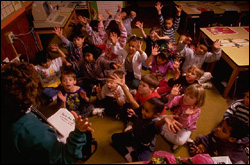Passkeys Foundation -
Jefferson Center for Character Education
Teaching Responsibility to America's Kids
The STAR program teaches children in grades K through 12 concepts, skills and behavior of good character, common core values, personal and civic responsibility. The program has been used in over 6,000 schools, approximately 60,000 classrooms reaching and impacting the lives of over 3,000,000 students. It focuses on systematic teaching of common values that cut across ethnic, cultural, and religious lines. These values include honesty, respect, responsibility, integrity, courage, caring, justice and politeness.

Why We Teach
"In recent years, myriad concerns by the public about today's youth have begun to merge into a call for renewed attention and response to the building of character and ethical behavior in school children of this nation. Increasingly, the consensus is that principles which should be heard from the preschool age in the home, the church and other community institutions, as well as school are no being adequately transmitted to the younger generation.
These concerns have arisen because of a constellation of factors that deserve the serious attention of school boards throughout the country.
Over the last few decades certain statistics that measure serious problems affecting the nations youth have shown alarming increases.
Another warning sign is the steady increase in the use of drugs by high school students through the 1970's. Nearly two-thirds of high school seniors, since 1980, report having used an illicit drug. As recently as 1985, 13% of high school seniors had used cocaine in the past year -- the highest level of use ever obserrved and more than twice the proportion in 1975. Although American young people may be using fewer drugs now, they nonetheless use more than the young people of any other industrialized nation. The use of alcohol is a particularly critical problem."
National School Boards Association's Leadership Report
"Building Character in the Public Schools," E987
Although written several years ago, sadly those words are as true today as ever. According to the National Household Survery on Drug Abuse by the Department of Health and Human Services, drug use among 12 yo 17 year-olds rose 78 percent from 1992 to 1995. Many substance abuse prevention programs provide factual information about drugs and their adverse physical effects on the user. However, the persistent abuse of drugs and alcohol suggests that this approach is not enough.
To accomplish the goal of demand reduction, curricula must also include the teaching of attitudes and skills that can be used by youth to say "No" to drugs and alcohol this year, next year and beyond. The same is true for sex and gangs.

How We Teach
Character education provides a strong foundation that improves school learning environment, student attendance and achievement. By making character education an integral part of school curricula, we can encourage young people to be successful in school and life as well as become productive members of the workforce and responsible citizens in society.
For more results, please review the results that we have acheived.
The Passkeys - Jefferson Center for Character Education focuses on the systematic teaching of common values:
- By introducing a basic language of responsibility
- By direct instruction through year-long sessions.
- By developing a school-wide effort to foster a culture of good character.
- By visual aids such as poster sets to reinforce the character values, concepts and behavior beign taught.
- By teaching content as well as process for making ethical decisions.
- By providing student involvement activities.
- By stressing the behavior we want students to practice.
- By involving the entire school staff.
- By involving parents in the program.
Results We Have Achieved
- Major discipline problems such as fighting, drugs and weapons decreased by 25%.
- Minor discipline problems dropped by 39%.
- Suspensions declined by 16%.
- Number of tardy students dropped by 40%.
- Unexcused adsences fell by 18%

